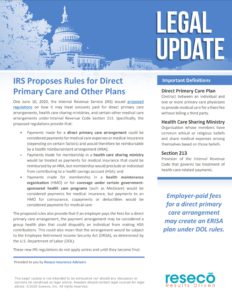On June 10, 2020, the Internal Revenue Service (IRS) issued proposed regulations on how it may treat amounts paid for direct primary care arrangements, health care sharing ministries, and certain other medical care arrangements under Internal Revenue Code Section 213.
Specifically, the proposed regulations provide that:
- Payments made for a direct primary care arrangement could be considered payments for medical care expenses or medical insurance (depending on certain factors) and would therefore be reimbursable by a health reimbursement arrangement (HRA);
- Payments made for membership in a health care sharing ministry would be treated as payments for medical insurance that could be reimbursed by an HRA, but membership would preclude an individual from contributing to a health savings account (HSA); and
- Payments made for membership in a health maintenance organization (HMO) or for coverage under certain government-sponsored health care programs (such as Medicare) would be considered payments for medical insurance, but payments to an HMO for coinsurance, copayments or deductibles would be considered payments for medical care.
The proposed rules also provide that if an employer pays the fees for a direct primary care arrangement, the payment arrangement may be considered a group health plan that could disqualify an individual from making HSA contributions. This could also mean that the arrangement would be subject to the Employee Retirement Income Security Act (ERISA), as determined by the U.S. Department of Labor (DOL).
These new IRS regulations do not apply unless and until they become final.
Employer-paid fees for a direct primary care arrangement may create an ERISA plan under DOL rules.
Important Definitions
Direct Primary Care Plan
Contract between an individual and one or more primary care physicians to provide medical care for a fixed fee without billing a third party.
Health Care Sharing Ministry
Organization whose members have common ethical or religious beliefs and share medical expenses among themselves based on those beliefs.
Section 213
Provision of the Internal Revenue Code that governs tax treatment of health care-related payments.
This Legal Update is not intended to be exhaustive nor should any discussion or opinions be construed as legal advice. Readers should contact legal counsel for legal advice. ©2020 Zywave, Inc. All rights reserved.



